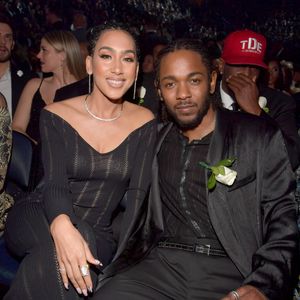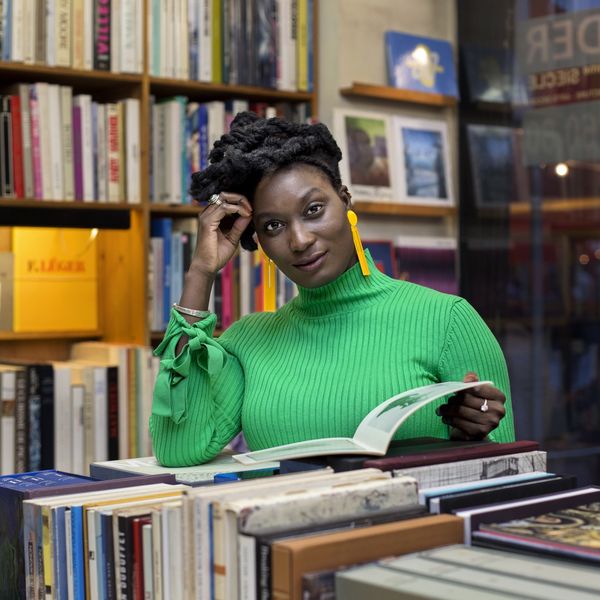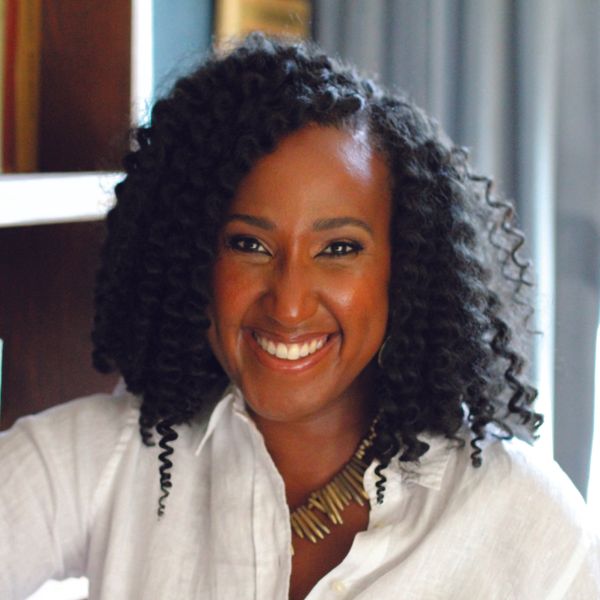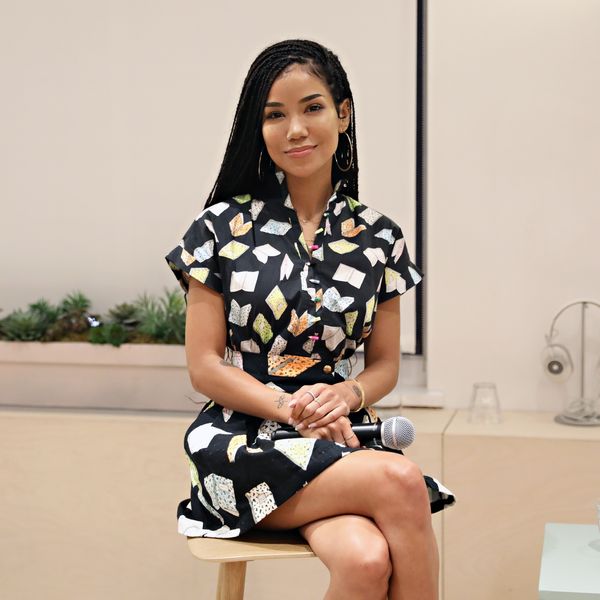
I Considered Myself A Bad Feminist Until I Read 'Hood Feminism'
xoNecole's I Read It So You Don't Have To is a recurring series of self-discovery that breaks down self-help books into a toolkit of takeaways and tips that are meant to assist you in finding the best life you can live. Take what works for you, and leave everything else where it is.
I considered myself a bad feminist until I read Mikki Kendall's Hood Feminism. This is mostly due to the perception of what mainstream feminism characterized itself as. For example, January 2017 comes to mind when I think of feminism. I consider the time when 4.6 million women—the majority of whom were white—demonstrated around the United States in favor of gender parity and the difficulties we would unavoidably encounter under the newly elected Donald Trump. I remember the placards insisting that people should never "grab their pussies." The banners complaining that "we" only get paid 75 cents for every man's dollar, and the shouts demanding equal pay, despite this being the least of our problems.
Yes, I give its superficiality a lot of thought.
While many lamented that women only earn 75 cents for every dollar earned by white males, I considered the reality that Latina, Indigenous, and Black women make even less. I considered all the significant concerns that were overlooked since white feminist issues constituted a huge portion of the feminist vision. However, I was unaware of the degree and rationale behind this contempt until I read Hood Feminism: Notes from the Women That a Movement Forgot.

Hood Feminism introduced me to the several reasons why I believe my feminist credentials were inadequate. It gave me insight into the various areas that feminism should concentrate on to achieve success in my lifetime and that of my potential children. It taught me how to be a feminist in ways I've always wanted to be. This book covers all the issues and arguments that feminists should be paying attention to, to ensure that feminism is more than just a term. It isn't necessarily a call to action, but it is a playbook of how to create feminist movements that hold the ideals of all individuals involved.
To be an effective feminist, we must emphasize Hood Feminism, and Kendall provides us with a number of strategies to help us do just that.
"Solidarity" Is for White Women
"We can't afford to wait for equality to trickle down eventually."
The Problem: The feminist agenda has prioritized narrowing the pay gap as the top feminist concern. While the salary gap is undoubtedly a problem that has to be addressed, the feminist movement's decision to make it a central issue is the ideal illustration of the trickle-down method and how solidarityis truly for white women. The idea behind the trickle-down approach is that if all women band together to address the problems facing the majority, like equal pay, then they would be able to assist minority groups in fulfilling their objectives. In essence, we should scratch their backs before they scratch ours.
Nevertheless, this idea functions only proficiently in theory. Particularly when minority concerns like food poverty, child care, and gun violence demand more urgent attention and action, while some legal processes—like equal pay—take years to resolve. The mainstream media makes us believe that solidarity means forgetting that other problems need to be addressed first.
With the clear difference between abstract ideals and very real lives, there isn't a possible way all women can stand united, when fighting one issue worsens the survivability of another.
How It Can Be Solved: It is obvious how to handle this problem: take care of the larger problems first, and the smaller ones will be taken care of afterward. Work on bigger concerns like child care services, gun violence, and food poverty, which impact all women regardless of race, rather than the wage gap, when the majority of women barely even make the alleged 75 cents to a white man's dollar.
Hunger
The Problem: Two other feminism-related concerns that must be at the forefront of the movement are affordable housing and food poverty. Families' capacity to make ends meet is rarely given much concern, despite the fact that women have access to food stamps and public housing, among other government support programs. Hunger disproportionately affects women, with food insecurity being more common in families headed by single women than in those headed by married couples or single men.
Even worse, women make up 60% of the lowest-paid workers in the nation despite making up almost half of the workforce. In addition to all of this, the majority of their income is allocated to housing and child care, which leaves very little money for household maintenance and much less for food purchases, particularly in light of the ongoing inflation. Everything is simply unaffordable.
How It Can Be Solved: Call for lawmakers to be held responsible and to boost federal nutrition programs via practical measures. Nearly two-thirds of adult and senior participants in the Supplemental Nutrition Assistance Program (SNAP) are female, yet the program offers very few advantages. The monies allotted to each household hardly even cover the costs of keeping the mother and kids fed. Increasing the monthly SNAP payment should be a top goal for policymakers in order to help more women become food secure and escape poverty.
Then, one may mention the pay disparity. Even though they make up the majority of workers, women still earn a lot less than males. As a result, women head homes that spend a larger percentage of their income on costs than men. Enforcing lawmakers to reduce the pay disparity may lead to more accessible housing and a decrease in food insecurity.
"Fast Girls" and the Festishization of Fierce
The Problem: Black women must mature more quickly than other girls. This is either due to expectations—where society stops viewing young black girls as girls around puberty—or needs—like needing to raise siblings or take care of oneself before one should. In any case, the perception that young Black girls are "fast" prevents them from being recognized for what they actually are: children. Given the battle being waged against Black girls, this adultification bias misses the fact that black girls need to learn how to fight, escape, and protect themselves at a very young age.
Black girls become strong women as a result of this instant adultification, and they are typically portrayed as "fierce" for conquering their surroundings. Sadly, this simply makes matters worse because Black women are increasingly viewed as self-sufficient and capable of defending themselves. They can preserve themselves because they are powerful. Because it is assumed that Black women can and will continue to help themselves, violence is inflicted upon them more frequently and major difficulties are disregarded.
How It Can Be Solved: Regard Black women as simply put, women—not "strong," nor "fierce." Regard them as people who deserve to be taken care of, fed, shielded, and given consideration. Black women and other minority groups need to be supported and encouraged when they seek help; instead of it being assumed they are capable of taking care of themselves.
Gun Violence
"The bullets that didn't hit me, still changed me."
The Problem: It is difficult to go five yards in predominately Black communities, where poverty meets life, without someone bringing up the topic of how unsafe the neighborhood is due to gun violence. Nevertheless, the same could apply to anyone who chooses to enter a public space in America, such as grocery stores, malls, hospitals, or schools. For the unfortunate, unforeseeable future, America and gun violence are synonymous. However, this truth is disregarded or publicized as a racial issue because it is only thought to exist in the context of poverty and Blackness. Never mind the sad truth, that women are the main victims of gun violence, due to domestic violence, mass shootings, and gang violence.
How It Can Be Solved: Gun violence must be seen by feminists as a feminist issue as much as a "Black issue." Guns are a leading cause of death for children in the United States; when they don't kill them, they terrorize them instead.
Race, Poverty, and Politics
The Problem: Always the savior, never the saved. Ironically, Black women are frequently viewed as the Democratic party's saviors. Black women voted 94% for Hilary in 2016, 96% for Obama in 2012, and 93% for Biden in 2020. Therefore, Democrats appeal to Black women if they want to win. However, Black women and their promised policies are frequently overlooked while legislation is being produced. Rather, the laws that are always remembered have to do with restricting Black women's rights and limited authority.
The majority of them lead to gerrymandering, such as that which is occurring in Alabama, or the development of laws that further downplay the hardships faced by Black women, such as poverty. Even worse, the policies that are being imposed are the result of white women's votes, who hurried to support the undermining of the laws that granted them the same liberties.
How It Can Be Solved: It is imperative that white feminists recognize the ways in which racism affects elections and the growing disparity in voting rights and access. Furthermore, Black women must recognize and resist ongoing limitations on our right to vote as well as the rights of other groups whose voting rights have been curtailed, such as those of those incarcerated. Racism is being utilized to deny our voices a platform and make our votes insignificant, and we can no longer afford to ignore this. This includes combating policies that undermine the right to vote, or even the right to vote easily, and making protecting voting rights a priority.
To understand other various ways you can use Hood Feminism to combat other feminist issues, such as education, housing, parenting while Black, the reigning patriarchy, reproductive justice, allies, and more, give Hood Feminism by Mikki Kendall a read or listen.
Let’s make things inbox official! Sign up for the xoNecole newsletter for daily love, wellness, career, and exclusive content delivered straight to your inbox.
Featured image by Drazen_/Getty Images
Taysha Robinson is a writer and high school English teacher, based in metro-Atlanta. A self described philomath, you can find her reading books and articles of every genre, attending educational conferences, and hiking wherever the terrain will allow.
These Newlyweds Found Love Thanks To A Friend Playing Matchmaker
How We Met is a series where xoNecole talks love and relationships with real-life couples. We learn how they met, how like turned into love, and how they make their love work.
Jason and Elise Robinson’s union is a reminder that kind people still get their happily ever after. The pair had their first date in October of 2021 and tied the knot on June 15, 2024. Both of them have dedicated their lives to celebrating and supporting Black culture so it was only fitting they get married in what's considered the Black Hollywood of America during the Juneteenth celebration weekend. From the florists to Elise and Jason's gown and suit designers to the table signage and so much more, everything was Black-owned. It's no wonder their love for Black culture was the jumping-off point for their love story.
When they met, Jason had just moved to Atlanta for a new job opportunity, and Elise was living happily in her career and had put dating on the backburner. But luckily, a mutual connection saw something in both of them and thanks to a yoga-themed baby shower and a chance text message, they found their forever. Check out their beautiful How We Met story below.
I’ll start with the easiest question. Can you both tell me a little bit about yourself and your background?
Elise: Sure, my name is Elise. I’m actually from Atlanta, GA – not a transplant. I grew up here and left right after college to pursue my career. Now I’ve been back going on eight years, and I’m in my early 40s.
Jason: And I’m Jason. I’m originally from Racine, Wisconsin. I went to school at Florida A&M University, so I am a rattler. I went back to the Midwest for a period of time, in Indianapolis. Now, I’ve been in the Atlanta area for a little over two and a half years.

Jason and Elise Robinson
Photo by FotosbyFola
Wow, that’s nice because Atlanta gets a bad rap when it comes to relationships. So you have to give us the deets. How did you two find each other?
Elise: So I work in TV and I was on-air for a number of years and then transitioned into being a producer and then a manager. As a producer, I’d always have guests on. And there was a woman who came on frequently named Rosalynn (@Rosalynndaniels, often referred to as The Black Martha Stewart), and we connected instantly. Anyway, she got pregnant right before COVID and invited me to a “modern-day yoga baby shower.” I came to support, but was also just curious about that theme.
I had an amazing time. And when it was over a few of us stuck around and convos got personal. She ended up asking me the infamous ‘Are you dating’ question. When I told her no, she decided to set me up. So I should tell you, in both of my only two serious relationships, I was set up – so I was like no.
But she pointed at her husband, who was folding up chairs, and said that another friend set her up with him. Sometimes, it takes people outside of us to see what we need. A few months later, she reached out and said she had family relocating and thought I’d really like him. So she gave him my number, and I reached out with a text. He responded with a call, and that night, we talked for about 2-3 hours. So that’s how we met. I was a little nervous because me and Rosalynn were starting a friendship, and here I was, talking to her family!
Jason: It was new for me too. Remember, I was new to the area, and I had heard so many “stories” about how people have been done wrong in the dating world. Whether it’s by theft or scamming (laughs). Plus, I had just got a new job and wanted to focus on that. But I did want to be able to date someone in a more personal way and see where it led. I felt like who better than someone who I trust to connect me. Rosalynn knows I’m private, about business life, and my personal life is important to me.
So let’s get into your courtship. What was your first date like?
Elise: We had our first convo on a Monday, and he asked me out the next day. I didn’t have any plans, but I still said no. I was just playing hard to get (laughs). But we were talking every day, and he told me he wanted to take me somewhere I’ve never been. And I’m like, you’re in my city! But he sends me three options, and sure enough, two of the places I hadn’t gone to. So, our first date was October 1, 2021, and somebody was 45 minutes late.
Now Jason, why were you 45 minutes late?
Elise: It was me – in my own city. I just got turned around, and the traffic was horrible. I kept calling him and giving him permission to leave. Full transparency: I probably wouldn’t have waited if the shoe was on the other foot. But this was my first sign of what I now know and love the most about him. It’s his patience. When I got there, I was frazzled and everything, but he was just super calm. It ended up being a great first date.
Jason: I remember just waiting and being concerned for her well-being. Because I know how traffic can be, especially when someone is rushing. I was just scrolling through my phone and looking through the menu. It was cool.

Elise and Jason Robinson
Courtesy
That’s beautiful. Now let’s talk about the “what are we” convo? Did you have one of those and if so, who initiated it and how was it?
Elise: I initiated it. Jason was dating me – and still does. But by this time, we had been on a number of dates. We were on our way to a winery, and we had a bit of a drive. So I decided to state my intention. We were just a few weeks in, but we were spending a lot of time together and we are people of a particular age. So I told him, I know Atlanta can be a Black man’s playground. There’s so many beautiful professional women here. But I’m dating with intention. I don’t want to kick it or hang with a good guy even though he’s not my person. I was done with all of that. So I’m “laying down the law” in my eyes, and he didn’t flinch. He let me finish and basically let me know we were on the same page. He was not trying to sow his royal oats.
Jason: Yeah, I was not trying to be Prince Akeem. But also, it was more so about setting a tone and goal for myself. My mama always told me to set my goals. And having a family was always one of mine. I think the biggest thing of it all, was I felt blessed – in terms of moving for work and meeting Elise, now being married. There’s victories being placed in my life.
I love that you both shared that because sometimes I get feedback on these stories and it seems like sometimes we’re afraid to really voice what we desire, no matter what that looks like.
Elise: Yeah, I think sometimes women feel like they don’t want to put pressure on their partner. But it’s not pressure. Look, Jason and I are based in faith, and what is for us is for us. Being upfront and honest is best – and early makes sense. You don’t have to convince someone to be your person.
Jason: I think her sharing those values resonated with me, and hearing her “lay down the law” was fine because I was there, too. I would say to millennial women, don’t be afraid to tell a mate what you want. You never know what that would lead to. Time is a precious commodity. Elise saying that early on showed me that she values both of our time. It showed her heart, character, and integrity, and I was drawn to that and the mature conversation. In the social media world, we don’t have those pointed conversations face-to-face. I would challenge readers to have those conversations in person, and you would get more from that convo than any post or reel. Because you see body language reactions and have deeper communication.
Yeah, I think sometimes women feel like they don’t want to put pressure on their partner. But it’s not pressure. Look, Jason and I are based in faith, and what is for us is for us. Being upfront and honest is best – and early makes sense. You don’t have to convince someone to be your person.
You both have mentioned time, family, and integrity. I’m curious what other core values do you both share?
Elise: Early on, our faith. Not just do you believe in God. It had to be deeper in that. I needed someone who would lead me, our home, and our family. I didn’t want to be in a push-and-pull relationship about prayer, church, or have conversations about being better people. Also, we discussed finances. That doesn’t just mean going to work. We chatted about ownership and what it looks like for us. How do we support each other individually and together? I know I like having my hands in a few different pots, and I needed someone who was supportive of that and likewise.
Jason: My background is that I was raised in the church. My father is a deacon and my mom is a deaconess. They've been married for 55 years. Faith was very important to me and it was crucial that my wife have that relationship as well.

Elise and Jason Robinson
Photo by FotosbyFola
Can we talk about challenges? Big or small, what are some things you had to grow through together?
Elise: I have never lived with anyone – not a roommate, a sister, friend, boyfriend or anything. Now, I’m in my 40s and I'm living with someone. When you’ve been by yourself for so long that was a challenge for both of us. We weren’t pulling each other's hair out but I’m a bit extreme. Things are color-coded in my closet. For me, working in news is chaotic so I want my home to be peaceful and organized.
Jason: I’m a man, and she’s a woman. That dynamic alone adds a flair to it. She wants things a certain way. She’s a Capricorn. But just in terms of how she wants to keep a home was a big adjustment for me. It took time.
On a smaller level, what are some of the things you disagree about day-to-day?
Elise: Cleanliness and systems. Like, he recycles and I do not. But sometimes I just have to decide if it really needs to be a thing or if I can just take care of it.
Jason: This is where my organization takes over (laughs).
What are your love languages? Do you know?
Elise: Jason’s is an act of service which works because I love cooking for him. It doesn’t feel like a chore to me. I love when I’m out, picking up his favorite juice. The other day I saw he needed t-shirts while folding clothes. So I just like doing small things for him that he doesn’t expect. He’s very much that guy that will ask to help so it doesn’t bother me.
Jason: I’d say Elise is all of them, but physical touch would probably be the biggest one. I had to get used to that. She’s taught me it in a number of ways. I remember we actually talked about love languages, and I sent her this song called “More Than Words” by Extreme. That explained to her how I felt.
Finally, can we end with the proposal? Tell us everything!
Jason: It was at a restaurant. And again, I was trying to find somewhere she hadn’t been. Also, I didn’t want to do it on our anniversary because that would have been too obvious. I contacted one of the restaurant’s staff and decided to change up the dessert menu. Each item was something special to us.
Elise: We go on so many date nights, so I just thought it was a regular night. We had finished eating, and I had to go to the bathroom. They had a nice mirror, girl. So I’m in there taking videos and stuff.
Jason: While she’s in the restroom, I’m getting everything in place with the waitress.
Elise: So as I’m reading the menu, I realize it’s telling our story and he eventually proposed. It was so special; I actually had the menu framed! It was so beautiful and thoughtful.
Let’s make things inbox official! Sign up for the xoNecole newsletter for love, wellness, career, and exclusive content delivered straight to your inbox.
Feature image by FotosbyFola
From Sipping Mocktails To Stretch Classes, This Cancun Resort Is A Wellness Paradise
My idea of the perfect vacation stay includes a clean, comfy room with stunning views, a variety of delicious food to eat, and an accommodating staff, and that’s exactly what I experienced when I visited the newly opened Hyatt Vivid Grand Island in Cancun, Quinta Roo, Mexico. It was my first time in the popular travel destination, and I was immediately enchanted by its beauty. I continued to revel in all of Cancun’s glory during my stay at Hyatt Vivid Grand Island, as it was designed as an indoor/ outdoor oasis.
When I first arrived at the all-inclusive adults-only resort, I was greeted with a tasty mocktail and received a tour of the facility. During the tour, I was blown away with every turn. The massive pool on the main level, the five restaurants, which we’ll get to later, and the extensive rooftop pool, which is the longest rooftop pool in Cancun. And with a rooftop comes views, and Hyatt Vivid didn’t disappoint. It’s situated between the Nichupté Lagoon and the Caribbean Ocean, which means guests get double the water views.
I was even more excited about the view from my room. My room overlooked Nichupté Lagoon, and throughout my stay, I would find myself being pulled to take in the view from my balcony or just sit and relax with a good book. The room itself was modern and spacious. The bathroom was a standout, thanks to the grand mirror that hits you when you first walk in and the roomy shower with two waterfall shower heads.

Bedroom
Courtesy

Bathroom
Courtesy
Food
If you’re a foodie like me, you’re in luck. Hyatt Vivid Grand Island has five restaurants, a taco truck, a café, and several bars. The first night, I had dinner at their Italian restaurant, Agilo. While I tried many dishes, my favorite was a pasta dish that had a nice kick to it. The next night, I tried their French restaurant, Le Lys, and enjoyed onion soup and ratatouille. But the grand finale was Oishii, a Japanese restaurant that turned out to be my favorite food experience during my whole trip.
The food was excellent, but the presentation for each course was even more exciting. I had a seven-course dinner that included a rack of lamb and mushroom dumplings, and I tried octopus for the first time. The resort is also very accommodating about food allergies and restrictions, which is helpful to those who want to have a stress-free time and not worry about whether what they eat will make them sick.

Octopus
Courtesy

Rack of lamb
Courtesy
Activities
As tempting as it is to stay in the room and melt into the cushy mattress, Cancun is all about fun in the sun, and there were many activities to accomplish that. My second day there was mostly spent at the resort’s beach club. It had a couple of pools, cabanas, a full-service bar, and a restaurant that sits right on the beach. As I sipped my many mocktails, I was embraced by the sun’s warmth and immersed in the scenic views of the turquoise waters the Caribbean Ocean is known for.
That morning, I participated in their stretch class that took place on their rooftop. It was a nice way to wake up the body while also being surrounded by 360-degree views of the coastal town. They offer many other activities on-site, including bracelet making, water aerobics, Black Jack, karaoke, and much more. If you’re looking for something a little more relaxed, then you can check out the spa, which offers a range of facials and massages. It did rain on and off during the trip, which made spa day the perfect activity as well.

Rooftop Pool
Courtesy

Stretch Class
Courtesy

Beach Club
Courtesy
Overall, my first time in Cancun was amazing. I met some awesome people, ate some great food, and walked away with a beautiful memory and a tan.
Let’s make things inbox official! Sign up for the xoNecole newsletter for daily love, wellness, career, and exclusive content delivered straight to your inbox.
Feature image courtesy









